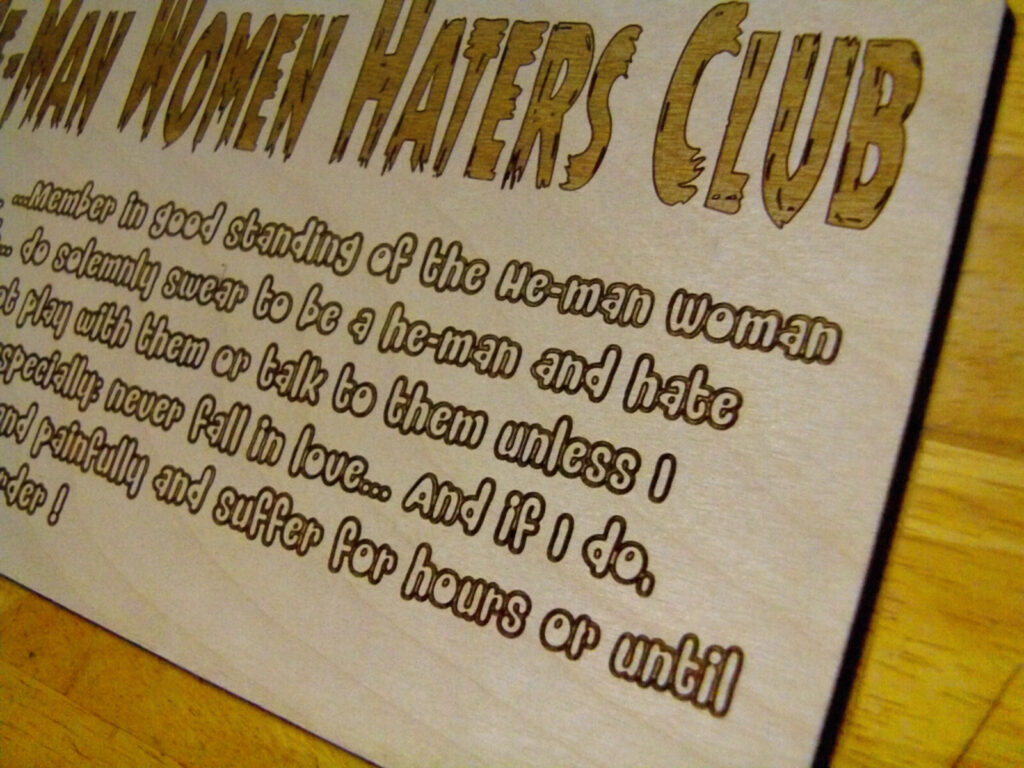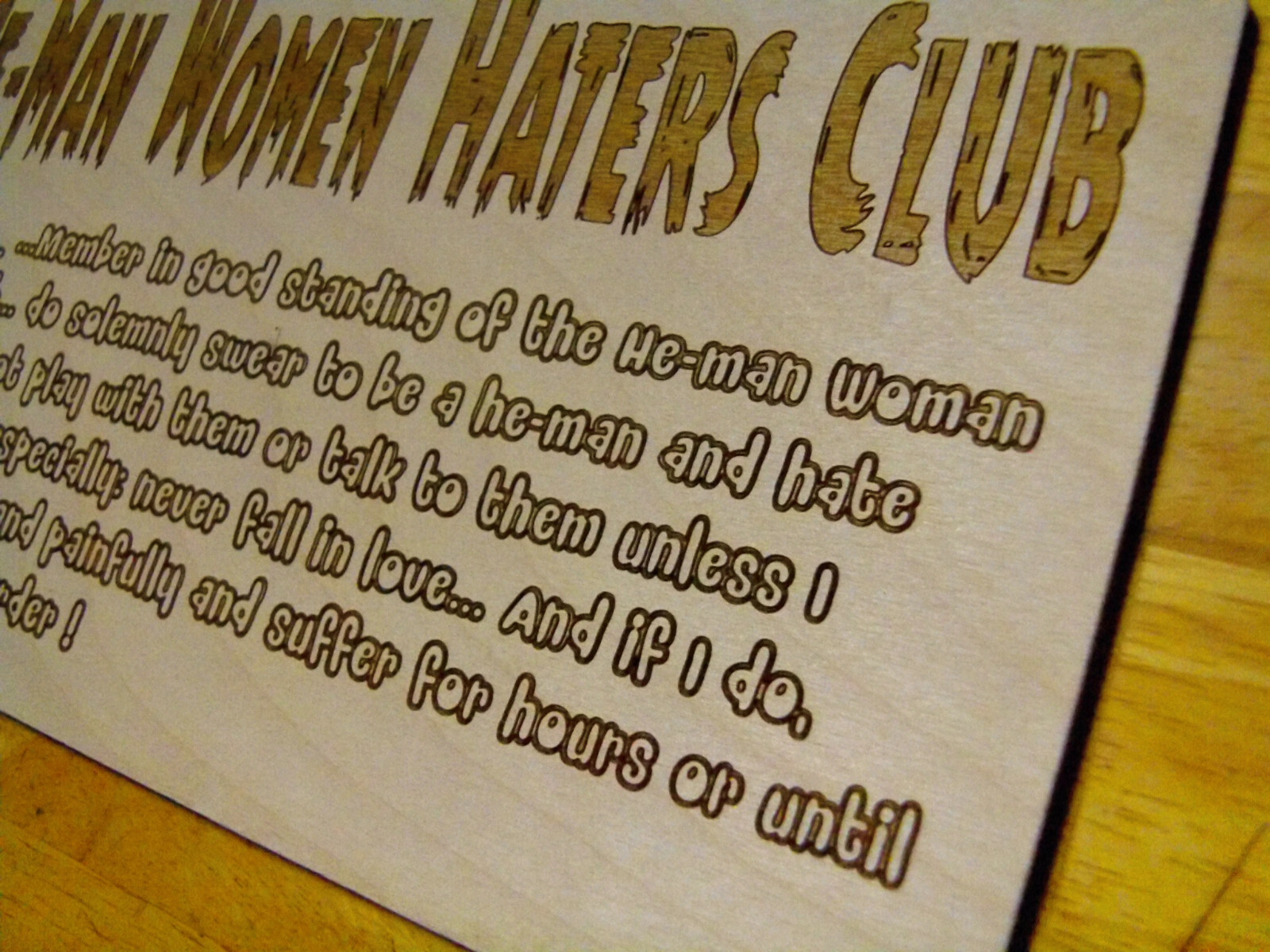
Decoding the He-Man Woman Haters Club Meaning: A Cultural Analysis
The phrase “He-Man Woman Haters Club” evokes a sense of nostalgic, albeit potentially problematic, imagery. Rooted in mid-20th-century American pop culture, the term has evolved from a lighthearted comedic trope to a subject of deeper socio-cultural analysis. Understanding the He-Man Woman Haters Club meaning requires examining its historical context, its portrayal in media, and its implications for gender dynamics.
Origins and Early Appearances
The concept of a “He-Man Woman Haters Club” gained prominence through its appearances in popular culture, particularly in comedic settings. One of the earliest and most recognizable examples is in the *Our Gang* (also known as *The Little Rascals*) series of short films. These films, popular from the 1920s to the 1940s, often featured a group of young boys who formed such a club, typically with the stated aim of excluding girls and maintaining a boys-only environment.
In these early portrayals, the He-Man Woman Haters Club meaning was largely innocent and comedic. It represented a childish desire for independence and a rejection of the perceived annoyances of girls. The clubs were often depicted as being short-lived and ultimately unsuccessful, with the boys eventually realizing the value of female companionship or being outsmarted by the girls.
Evolution in Pop Culture
Over time, the “He-Man Woman Haters Club” trope continued to appear in various forms of media, including cartoons, movies, and television shows. While the basic premise remained the same – a group of boys or men attempting to exclude women – the nuances and implications of the concept began to evolve.
In some instances, the club was portrayed as a more serious attempt to assert male dominance or to resist changing gender roles. In others, it served as a satirical commentary on male insecurity and the fear of female empowerment. The He-Man Woman Haters Club meaning, therefore, became more complex and multifaceted, reflecting broader societal attitudes towards gender.
Examples in Film and Television
Several films and television shows have featured variations of the “He-Man Woman Haters Club” trope. These examples illustrate the diverse ways in which the concept has been interpreted and used for comedic or dramatic effect.
- *The Little Rascals* (Various): As mentioned earlier, the *Our Gang* series is a quintessential example of the early “He-Man Woman Haters Club.” The clubs were portrayed as childish and ultimately harmless.
- *The Simpsons* (Television Series): The animated sitcom *The Simpsons* has parodied the concept in various episodes, often depicting Bart Simpson and his friends forming a similar club with humorous consequences.
- *Boy Meets World* (Television Series): This coming-of-age sitcom explored the dynamics of male friendships and relationships, occasionally referencing the idea of a “He-Man Woman Haters Club” as a symbol of youthful rebellion.
Socio-Cultural Implications
Beyond its comedic value, the “He-Man Woman Haters Club” trope raises important questions about gender roles, power dynamics, and societal attitudes towards women. While the early portrayals may have been relatively innocent, the concept can also be seen as a reflection of underlying sexism and misogyny.
The idea of excluding women from certain spaces or activities, even in a playful manner, can reinforce harmful stereotypes and contribute to a culture of gender inequality. The He-Man Woman Haters Club meaning can, therefore, be interpreted as a microcosm of broader societal issues related to gender discrimination and the marginalization of women.
Feminist Perspectives
From a feminist perspective, the “He-Man Woman Haters Club” trope can be viewed as a manifestation of patriarchal power structures. The act of excluding women and asserting male dominance, even in a seemingly innocuous way, can be seen as a way of maintaining male privilege and reinforcing traditional gender roles.
Feminist scholars and activists have argued that such tropes can contribute to a culture of sexism and misogyny, even if they are not intended to be explicitly harmful. By perpetuating the idea that men and women should be segregated or that men are inherently superior, these tropes can undermine efforts to promote gender equality.
Modern Interpretations and Relevance
In the 21st century, the “He-Man Woman Haters Club” trope continues to resonate, albeit with a greater awareness of its potential implications. While the concept may still be used for comedic purposes, it is often approached with a more critical and nuanced perspective.
Modern interpretations of the trope often involve a self-aware acknowledgment of the problematic aspects of male exclusion and a willingness to challenge traditional gender roles. The He-Man Woman Haters Club meaning has evolved to encompass a broader understanding of gender dynamics and the importance of inclusivity.
Online Communities and Social Media
The internet and social media have provided new platforms for discussions about gender and the “He-Man Woman Haters Club” trope. Online forums and social media groups often debate the merits and drawbacks of the concept, with some users defending it as a harmless expression of male bonding and others criticizing it as a form of sexism.
These online discussions highlight the ongoing relevance of the trope and the need for critical engagement with its underlying assumptions. By examining the He-Man Woman Haters Club meaning in the context of contemporary social and political issues, we can gain a deeper understanding of the complexities of gender dynamics in the 21st century.
The Broader Context of Gender Dynamics
Understanding the “He-Man Woman Haters Club” requires placing it within the broader context of gender dynamics. It’s not just about excluding women; it reflects anxieties, insecurities, and power imbalances that have shaped societies for centuries. The very existence of such a concept points to a need for healthier, more equitable relationships between men and women.
Examining the He-Man Woman Haters Club meaning forces us to confront uncomfortable truths about societal attitudes towards gender. It challenges us to question the assumptions and stereotypes that underpin these attitudes and to work towards creating a more inclusive and equitable world.
Promoting Inclusivity and Equality
Ultimately, the goal should be to move beyond the exclusionary dynamics of the “He-Man Woman Haters Club” and to embrace a more inclusive and equitable approach to gender relations. This requires challenging harmful stereotypes, promoting gender equality in all areas of life, and fostering a culture of respect and understanding between men and women.
By engaging in open and honest conversations about gender, we can dismantle the barriers that separate men and women and create a society where everyone has the opportunity to thrive. The He-Man Woman Haters Club meaning serves as a reminder of the challenges we face and the importance of working together to build a better future for all.
Conclusion
The “He-Man Woman Haters Club” is more than just a comedic trope; it’s a cultural artifact that reflects deeper societal attitudes towards gender. Understanding the He-Man Woman Haters Club meaning requires examining its historical context, its portrayal in media, and its implications for gender dynamics. While the concept may have originated as a relatively innocent expression of youthful rebellion, it can also be seen as a reflection of underlying sexism and misogyny.
By critically engaging with the “He-Man Woman Haters Club” trope, we can gain a deeper understanding of the complexities of gender dynamics and work towards creating a more inclusive and equitable society. It serves as a reminder of the importance of challenging harmful stereotypes, promoting gender equality, and fostering a culture of respect and understanding between men and women. The phrase “He-Man Woman Haters Club” can be a starting point for conversations about inclusivity and respectful relationships.
The journey from a “He-Man Woman Haters Club” mentality to one of genuine equality requires continuous effort and self-reflection. By acknowledging the historical and cultural baggage associated with the term, we can pave the way for a future where such exclusionary concepts are relegated to the past. The He-Man Woman Haters Club meaning should serve as a cautionary tale, urging us to strive for a more inclusive and equitable world.
[See also: Gender Roles in Modern Society]
[See also: The History of Misogyny]
[See also: Promoting Gender Equality in the Workplace]

